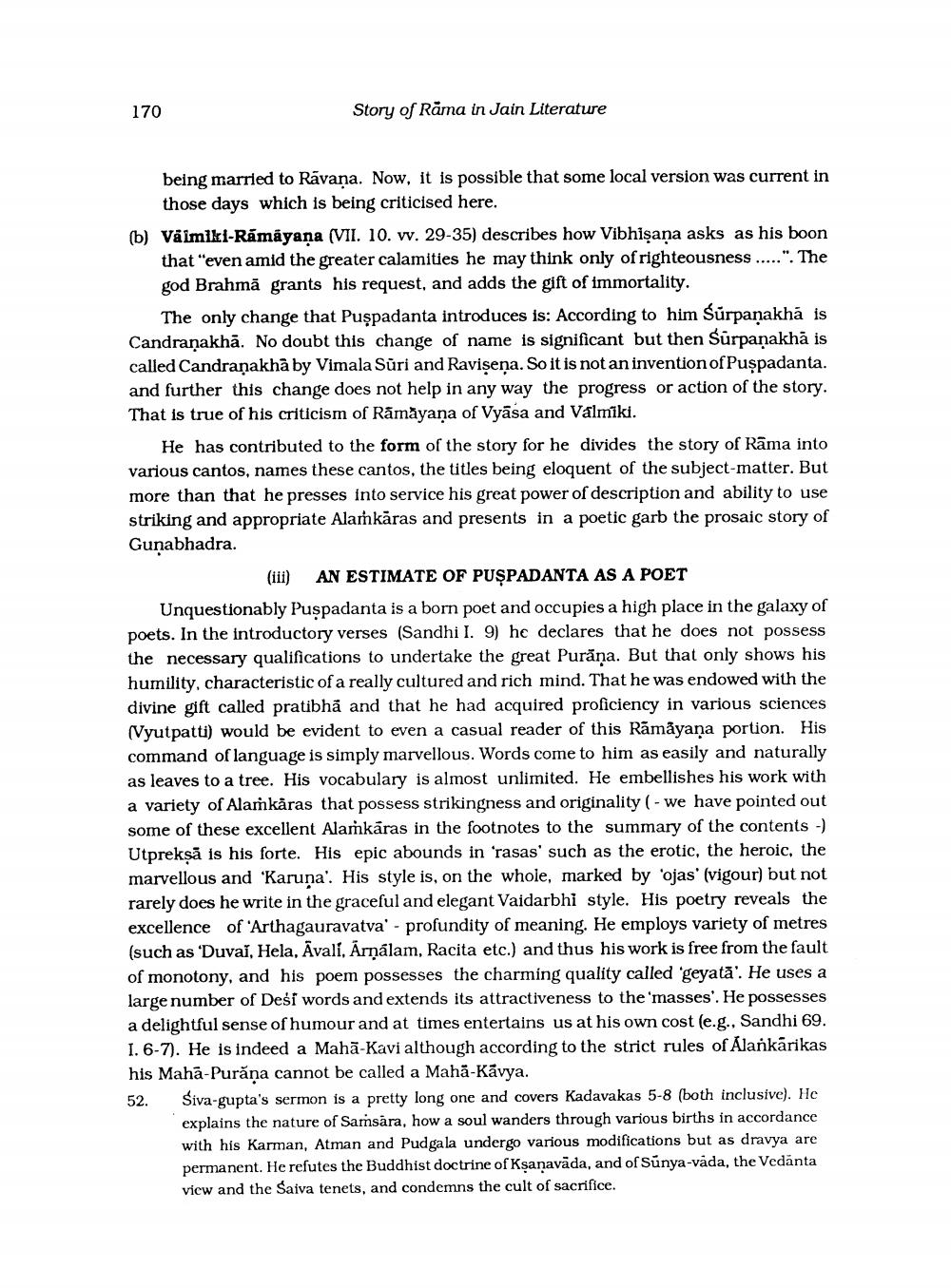________________
170
Story of Rama in Jain Literature
being married to Rāvana. Now, it is possible that some local version was current in those days which is being criticised here.
(b) Valmiki-Rámāyaṇa (VII. 10. vv. 29-35) describes how Vibhlṣaṇa asks as his boon that "even amid the greater calamities he may think only of righteousness.....". The god Brahma grants his request, and adds the gift of immortality.
The only change that Puspadanta introduces is: According to him Surpanakha is Candraṇakha. No doubt this change of name is significant but then Surpanakha is called Candranakha by Vimala Sûri and Ravişena. So it is not an invention of Puspadanta. and further this change does not help in any way the progress or action of the story. That is true of his criticism of Rāmāyaṇa of Vyasa and Valmiki.
He has contributed to the form of the story for he divides the story of Rama into various cantos, names these cantos, the titles being eloquent of the subject-matter. But more than that he presses into service his great power of description and ability to use striking and appropriate Alarhkäras and presents in a poetic garb the prosaic story of Gunabhadra.
(iii) AN ESTIMATE OF PUSPADANTA AS A POET
Unquestionably Puspadanta is a born poet and occupies a high place in the galaxy of poets. In the introductory verses (Sandhi I. 9) he declares that he does not possess the necessary qualifications to undertake the great Purana. But that only shows his humility, characteristic of a really cultured and rich mind. That he was endowed with the divine gift called pratibha and that he had acquired proficiency in various sciences (Vyutpatti) would be evident to even a casual reader of this Rāmāyaṇa portion. His command of language is simply marvellous. Words come to him as easily and naturally as leaves to a tree. His vocabulary is almost unlimited. He embellishes his work with a variety of Alarhkäras that possess strikingness and originality (- we have pointed out some of these excellent Alaṁkāras in the footnotes to the summary of the contents -) Utprekṣā is his forte. His epic abounds in 'rasas' such as the erotic, the heroic, the marvellous and 'Karuna'. His style is, on the whole, marked by ojas' (vigour) but not rarely does he write in the graceful and elegant Vaidarbhi style. His poetry reveals the excellence of 'Arthagauravatva - profundity of meaning. He employs variety of metres (such as 'Duvai, Hela, Avali, Arnálam, Racita etc.) and thus his work is free from the fault of monotony, and his poem possesses the charming quality called 'geyata'. He uses a large number of Desi words and extends its attractiveness to the 'masses'. He possesses a delightful sense of humour and at times entertains us at his own cost (e.g., Sandhi 69. I. 6-7). He is indeed a Maha-Kavi although according to the strict rules of Ålankärikas his Maha-Purăņa cannot be called a Maha-Kavya.
52.
Śiva-gupta's sermon is a pretty long one and covers Kadavakas 5-8 (both inclusive). He explains the nature of Samsara, how a soul wanders through various births in accordance with his Karman, Atman and Pudgala undergo various modifications but as dravya are permanent. He refutes the Buddhist doctrine of Kṣaṇavāda, and of Sunya-vada, the Vedanta view and the Saiva tenets, and condemns the cult of sacrifice.




